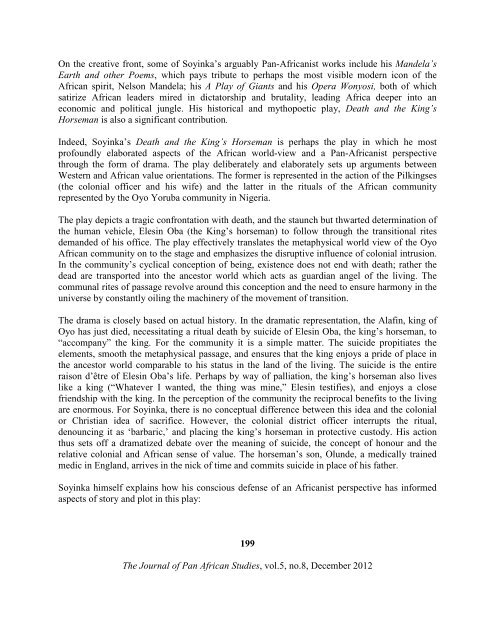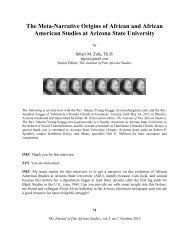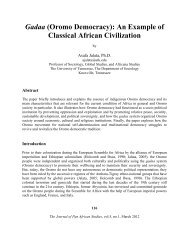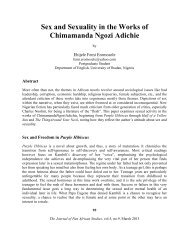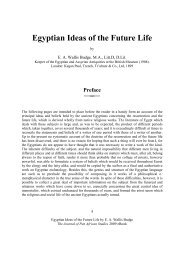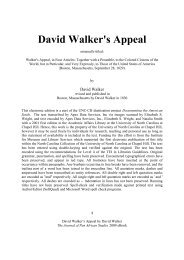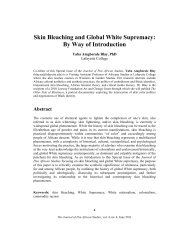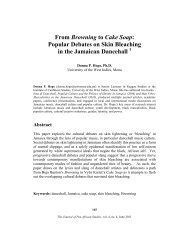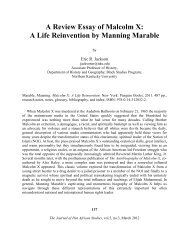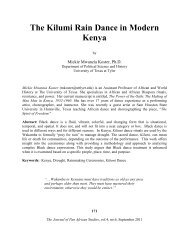view PDF - Journal of Pan African Studies
view PDF - Journal of Pan African Studies
view PDF - Journal of Pan African Studies
You also want an ePaper? Increase the reach of your titles
YUMPU automatically turns print PDFs into web optimized ePapers that Google loves.
On the creative front, some <strong>of</strong> Soyinka’s arguably <strong>Pan</strong>-<strong>African</strong>ist works include his Mandela’s<br />
Earth and other Poems, which pays tribute to perhaps the most visible modern icon <strong>of</strong> the<br />
<strong>African</strong> spirit, Nelson Mandela; his A Play <strong>of</strong> Giants and his Opera Wonyosi, both <strong>of</strong> which<br />
satirize <strong>African</strong> leaders mired in dictatorship and brutality, leading Africa deeper into an<br />
economic and political jungle. His historical and mythopoetic play, Death and the King’s<br />
Horseman is also a significant contribution.<br />
Indeed, Soyinka’s Death and the King’s Horseman is perhaps the play in which he most<br />
pr<strong>of</strong>oundly elaborated aspects <strong>of</strong> the <strong>African</strong> world-<strong>view</strong> and a <strong>Pan</strong>-<strong>African</strong>ist perspective<br />
through the form <strong>of</strong> drama. The play deliberately and elaborately sets up arguments between<br />
Western and <strong>African</strong> value orientations. The former is represented in the action <strong>of</strong> the Pilkingses<br />
(the colonial <strong>of</strong>ficer and his wife) and the latter in the rituals <strong>of</strong> the <strong>African</strong> community<br />
represented by the Oyo Yoruba community in Nigeria.<br />
The play depicts a tragic confrontation with death, and the staunch but thwarted determination <strong>of</strong><br />
the human vehicle, Elesin Oba (the King’s horseman) to follow through the transitional rites<br />
demanded <strong>of</strong> his <strong>of</strong>fice. The play effectively translates the metaphysical world <strong>view</strong> <strong>of</strong> the Oyo<br />
<strong>African</strong> community on to the stage and emphasizes the disruptive influence <strong>of</strong> colonial intrusion.<br />
In the community’s cyclical conception <strong>of</strong> being, existence does not end with death; rather the<br />
dead are transported into the ancestor world which acts as guardian angel <strong>of</strong> the living. The<br />
communal rites <strong>of</strong> passage revolve around this conception and the need to ensure harmony in the<br />
universe by constantly oiling the machinery <strong>of</strong> the movement <strong>of</strong> transition.<br />
The drama is closely based on actual history. In the dramatic representation, the Alafin, king <strong>of</strong><br />
Oyo has just died, necessitating a ritual death by suicide <strong>of</strong> Elesin Oba, the king’s horseman, to<br />
“accompany” the king. For the community it is a simple matter. The suicide propitiates the<br />
elements, smooth the metaphysical passage, and ensures that the king enjoys a pride <strong>of</strong> place in<br />
the ancestor world comparable to his status in the land <strong>of</strong> the living. The suicide is the entire<br />
raison d’être <strong>of</strong> Elesin Oba’s life. Perhaps by way <strong>of</strong> palliation, the king’s horseman also lives<br />
like a king (“Whatever I wanted, the thing was mine,” Elesin testifies), and enjoys a close<br />
friendship with the king. In the perception <strong>of</strong> the community the reciprocal benefits to the living<br />
are enormous. For Soyinka, there is no conceptual difference between this idea and the colonial<br />
or Christian idea <strong>of</strong> sacrifice. However, the colonial district <strong>of</strong>ficer interrupts the ritual,<br />
denouncing it as ‘barbaric,’ and placing the king’s horseman in protective custody. His action<br />
thus sets <strong>of</strong>f a dramatized debate over the meaning <strong>of</strong> suicide, the concept <strong>of</strong> honour and the<br />
relative colonial and <strong>African</strong> sense <strong>of</strong> value. The horseman’s son, Olunde, a medically trained<br />
medic in England, arrives in the nick <strong>of</strong> time and commits suicide in place <strong>of</strong> his father.<br />
Soyinka himself explains how his conscious defense <strong>of</strong> an <strong>African</strong>ist perspective has informed<br />
aspects <strong>of</strong> story and plot in this play:<br />
199<br />
The <strong>Journal</strong> <strong>of</strong> <strong>Pan</strong> <strong>African</strong> <strong>Studies</strong>, vol.5, no.8, December 2012


